Men Who Take Baths
Christopher Bautista
Canada, 2021
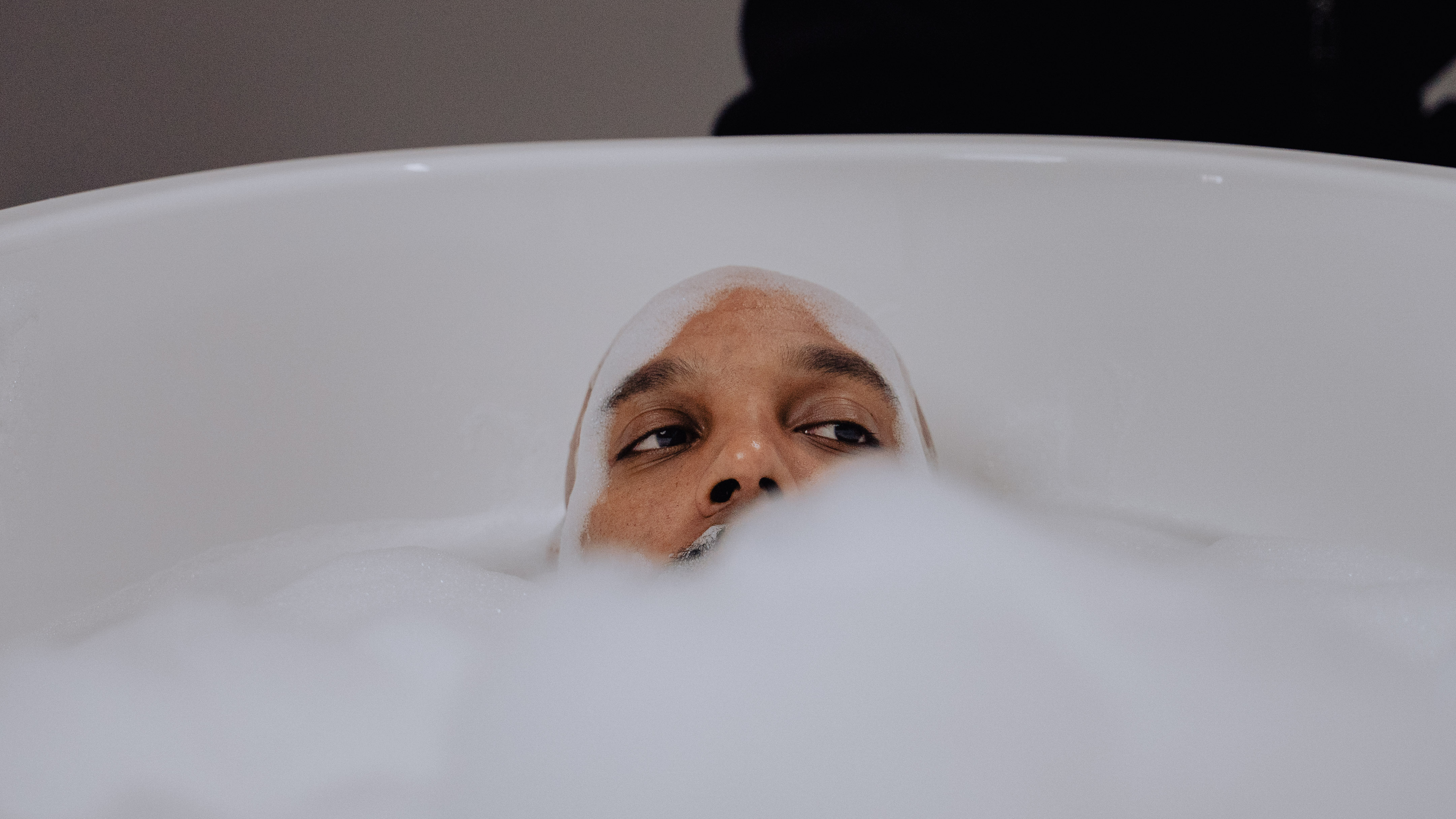
I think masculinity is performance. I think femininity is a performance.
Why did you say yes?
Anything for you, Nicolle. I remember when I first saw your Instagram that was like one of the first things that I saw. I was like, Oh, "Men Who Take Baths." I love that. I love taking baths, you know? So, sign me up.
As we were joking before, you are quite literally sitting in hot water about to answer questions around masculinity and feminism, but just to reiterate there are no wrong answers. And this is about your story and hearing where you've come from and how you ended up here in the bath.
Wow.
Every decision you've ever made has led you here to being interviewed in a bathtub surrounded by a bunch of strangers.
Look what I've done.
What is the first thing that comes to mind when you hear the term 'toxic masculinity'?
The first thing that comes to mind is when I was growing up, and my dad, bless his heart, I cried one time in front of him.
I remember he said to me "Don't ever let anyone see you cry."
And just when you said that to me now, it's just that sort of wrong sentiment, very incorrect sentiment that men can't be vulnerable and men can't show their feelings.
I knew it was all BS years later when I saw him cry.
I think that he's probably let go of that a lot since then too, when someone else told him that, right?
Either that or the need to control, the need to posture, and say like, 'this is mine and you're lower than me.' I think it's intertwined with the society that we live in. Toxic masculinity is wrapped into everything.
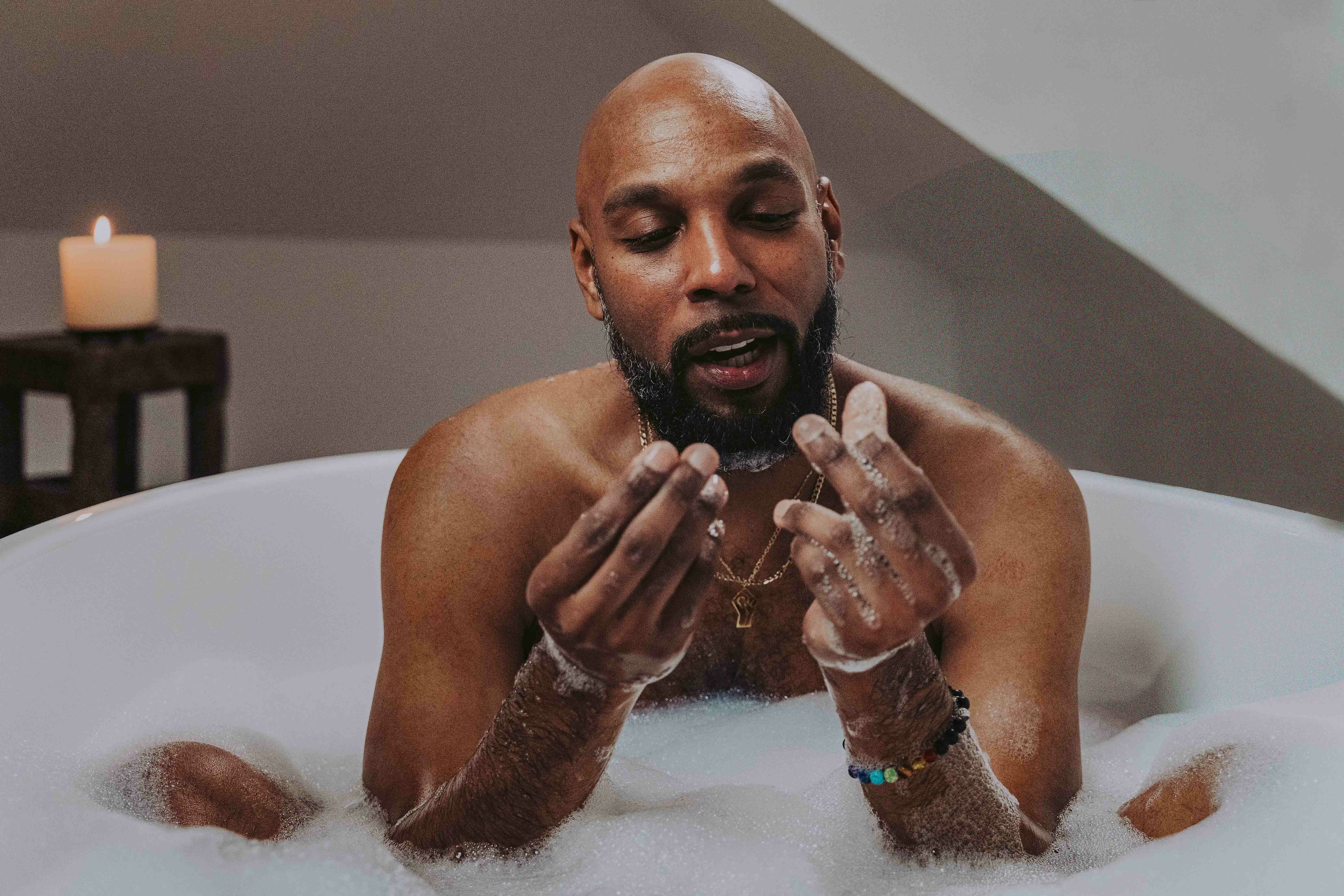
How have you started to rewire and unlearn that within yourself, especially if it was ingrained in you so young? Was it the moment you saw your dad cry, was that the shift?
No, no. I mean, I was in the military too. So, if you want to talk toxic masculinity...I learned a lot of great lessons in the military and work ethic and camaraderie, and this amazing body --
Oh, yeah?
It's not an accident.
But I think that years later, I started to notice, 'Oh that probably doesn't feel right.' And usually, it's not going to be a comfortable process. It's like when you realize that there's something that you could have done better or done differently. I think it takes an extreme amount of awareness and the ability to forgive yourself and to be wrong. It takes space to be wrong. I think that in order to rewire that we have to provide space for people to want to do that.
And to be okay with being wrong?
Yeah.
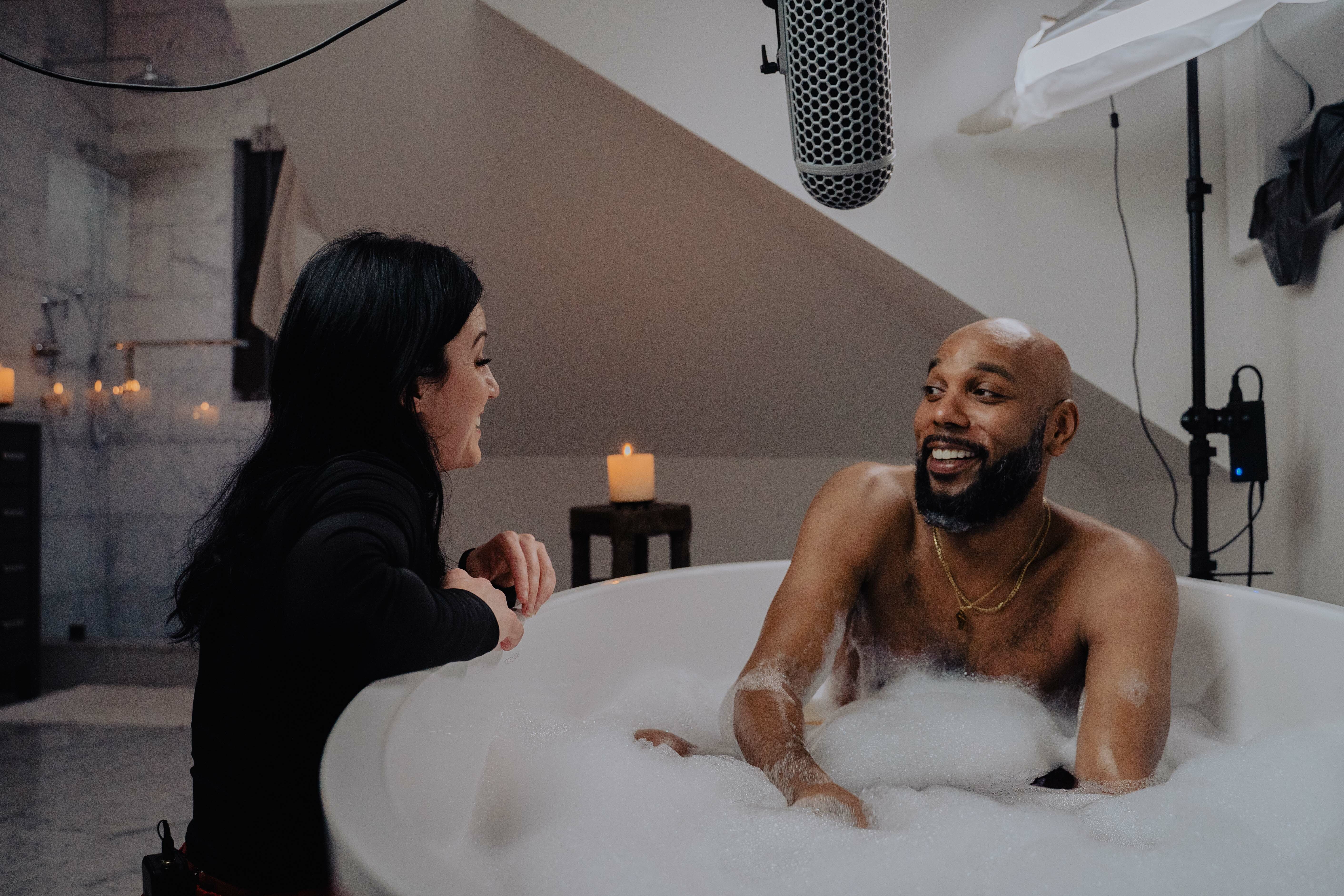
What has been the toll of cancel culture?
I think that, on one hand, I understand how we don't want to reward good or bad behavior, right? But on the other hand, show me a person that has never done anything wrong in their life, and it comes at varying degrees.
In order for us to really produce a society where people are going to hold themselves accountable, I think it's going to take us allowing for people to still exist.
But for people to not only admit when they're wrong or to be identified as wrong, it's like, okay, we can call it out, but how can we, I've heard that term "call it in."
How can we create a society where it's less about punishing and vengeance and more about creating a society that we don't want those things to happen again? And truly holding someone accountable, truly allowing for that process of forgiveness to take place?
Now, with that forgiveness there comes admitting, making up the damage, not doing it again, and again, and again. So there are all sorts of things that come with that. But I think the toll that cancel culture has taken, is...
I can think of one example of this young man. There was someone that I know that's super close to me. There was a page that was put up on Instagram about him and said his name and called him an abuser. And just specifically that one situation, the toll on his mental health, like in my eyes, to publicly lynch someone like that, you know?
I think that the sooner that we figure out that we're all human and none of us are perfect and we can do some really horrible things to one another, and those things don't have to be condoned.
On the other hand, it's like, well, how do we truly create a society that you can make a mistake and own up to that mistake and figure out a way to do something differently in a way to change that behavior?
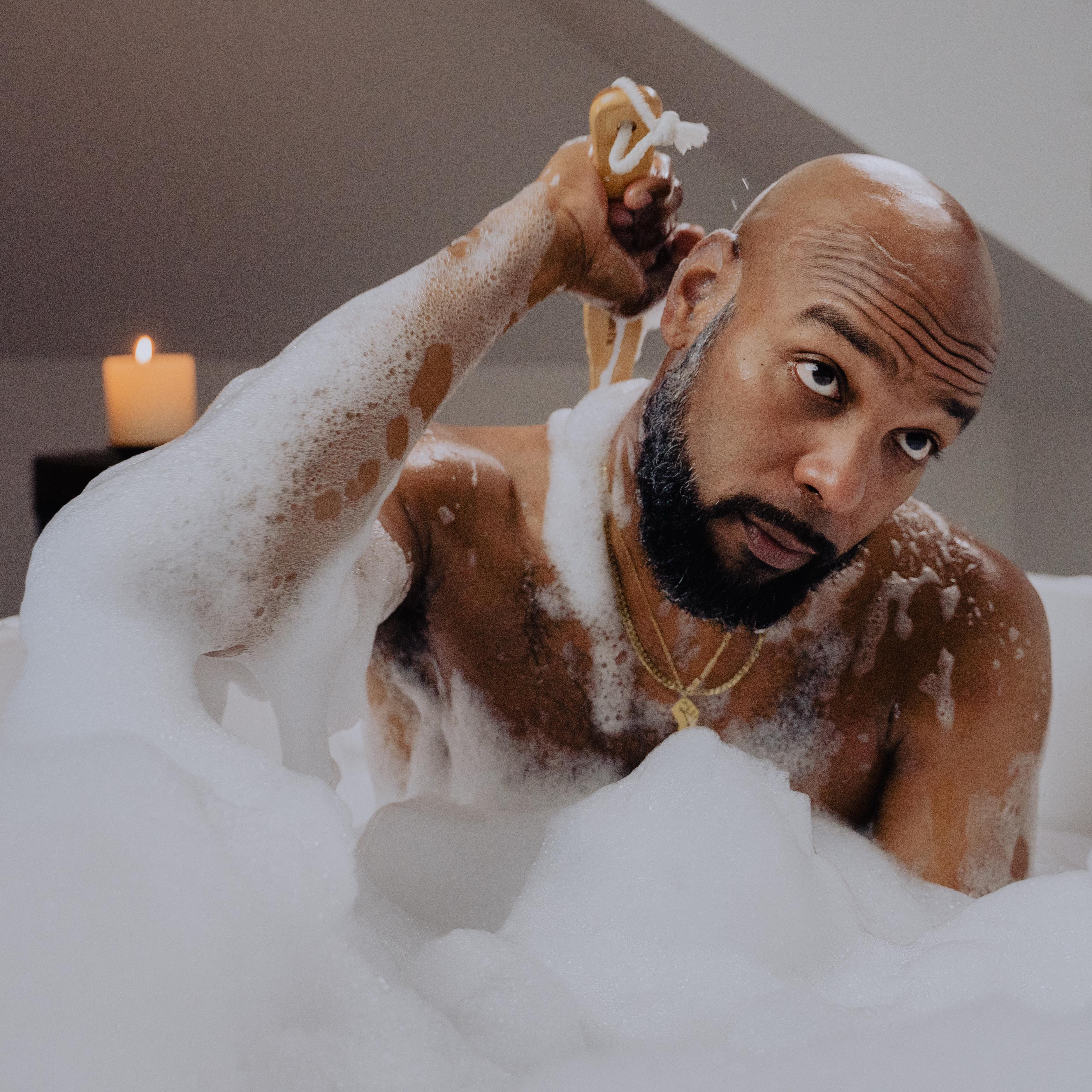
I don't know of a racist that's going to be less racist because they lose their job. Do you know what I mean?
We'll just call him Travis that works at DavidsTea. He is not going to get fired from his job at DavidsTea for having a racist video online and be less racist as a result of that, right?
It's probably going to take him having a Black friend. Having that kind of personal connection with that person.
I don't have the answer about cancel culture because I want to see people held accountable for the things that they've done wrong but I also want to see people given the space to grow and change, as long as it doesn't come at the safety of someone else.
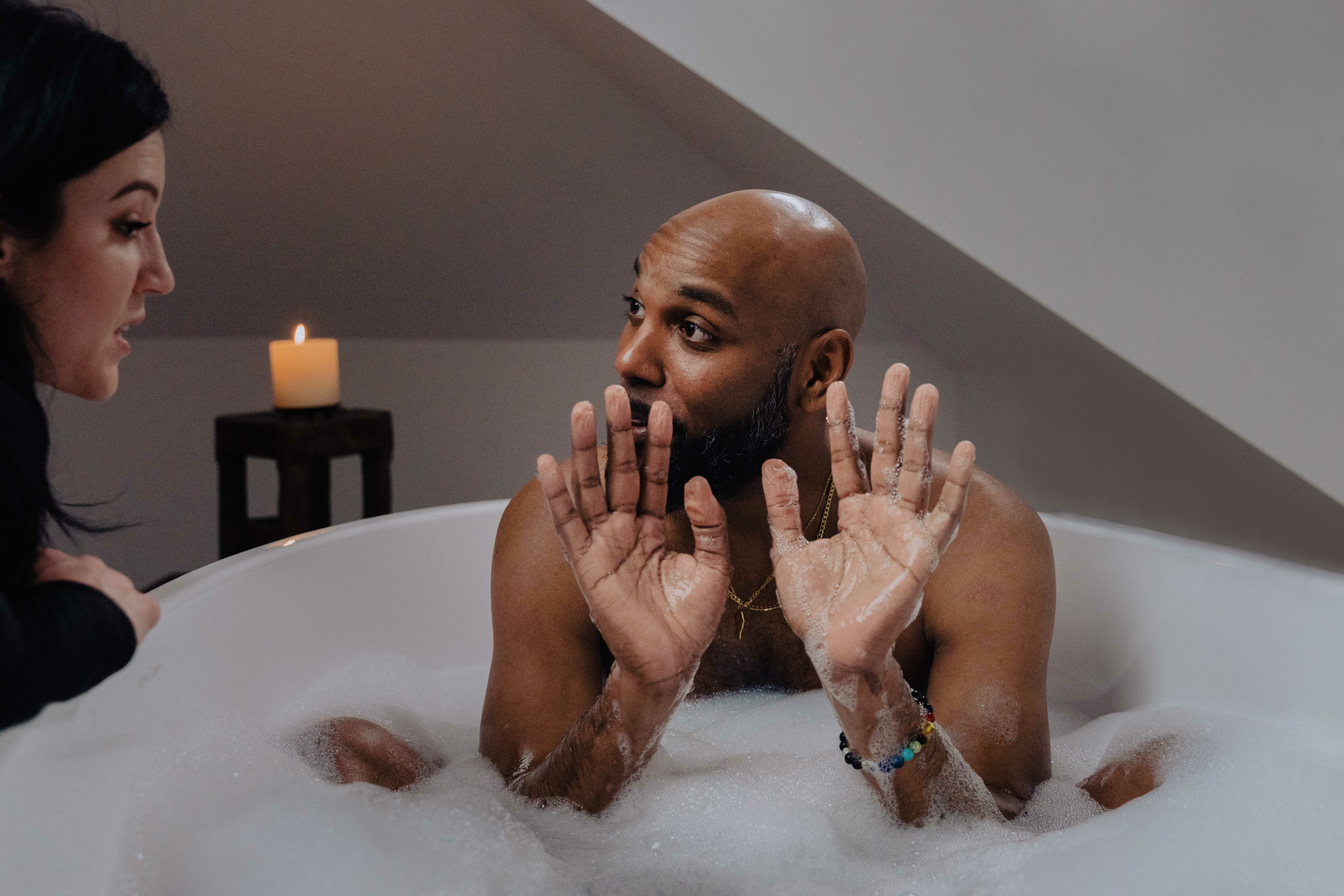
What does equality actually look like?
It's a challenge, right?
On the one hand, equality should mean freedom for all to live, exist, express themselves, be able to strive for happiness, the pursuit of happiness, all those things that are written into the constitution. But on the other, it seems like we're talking about things that have nothing to do with equality, basic level things, like the ability to walk down the street without a target on your back because of the color of your skin.
To me, equality looks like you being able to do that, but more so, it looks like someone not being subjugated because they're a woman or because they're Black or because they're gay or because whatever they are or whatever choices that they've made, so long as those choices haven't hurt someone else.
It's so interesting to have these conversations because the people that understand this, understand it. But how do we reach people that don't get it, people that are sexist or racist to varying degrees. How do we actually reach those people and have them listen to something like this and understand that the ways that they're living or behaving are damaging not just to those around them but to themselves?
Art.
Art?
Yeah. Art. I know it seems crazy, but to me, art is one of the only ways that you can see yourself through the eyes of another and vice versa. You can see others through your eyes or even their eyes.
I think it comes down to perspective. We can both be looking at the same thing and seeing totally different things.
It's not that one of our perspectives is wrong or more right than the other. It's just that's from our perspective, right? That's a lot to swallow. It's like, wait, sexists are right? Well, they are from their perspective. Nobody thinks they're the bad guy.
No one's the villain in their own story.
Everybody's their own hero, right? It's about trying to figure out what position they're looking at it from, and then figuring out a way to bridge that gap between how they're looking at it and how I'm looking at it. We don't have to meet on the opposite side, but is there a third point that we can meet at to see a clearer picture of the same thing. Does that make sense?
It does.
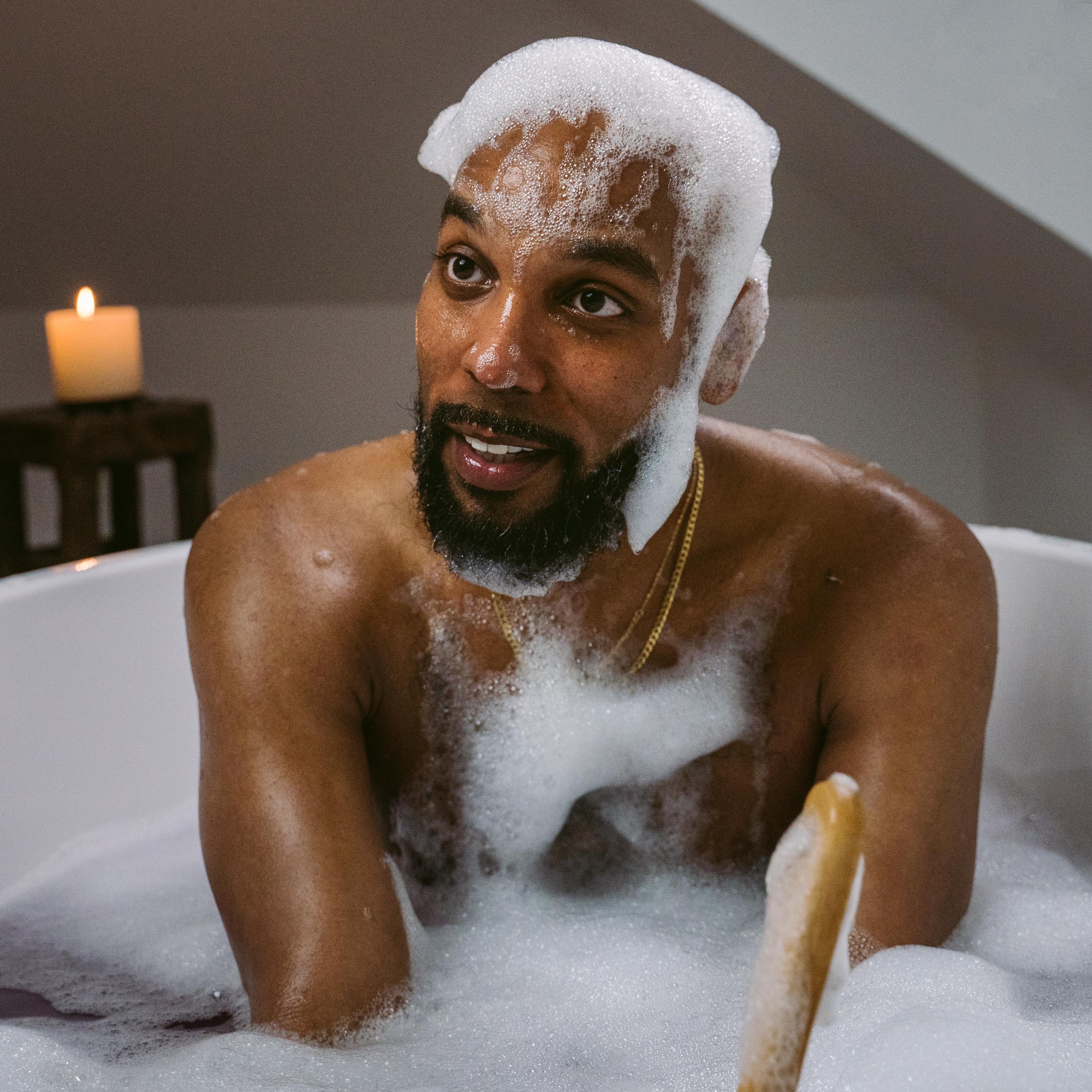
What comes to mind when I say mental health?
Self-love, self-care, meditating, working out, nutrition, taking care of your physical fitness as a way to ensure that you take care of what's going on inside.
Also what comes to mind is this very, very interesting time that we're in right now where people have been forced to slow down and look at things that they didn't look at in the past, maybe things that were in that drawer that they never really dealt with.
Rather than making it about everyone else make it about yourself. What have you discovered during this time?
I made my own moisturizer with jojoba oil and shea butter. That was something that was great for my mental health. Something so simple.
Also what comes to mind is, as a Black man in North America, mental health growing up was not something that we typically discussed. Other than my grandma, I can probably count on my hands the number of people that asked me how I was doing but really cared how I was doing.
What comes to mind is having those difficult conversations--
--with yourself?
With yourself and with people that are in your circle and are close to you.
What's an example of a difficult conversation from the male perspective?
Let's just say I have a friend who has been having a tough go. I feel like, historically, men have been put in this position where they have to pretend like everything's okay. They're not really given space to not be okay. The man has to always show up as a friend, father, brother, whatever, and just get it done. There's no space for you to not be alright.
A difficult conversation is like, if you're not okay or if your friend's not okay, you say, 'Man, I know you're not okay.' But then that friend may not even admit it to you. I've had so many guy friends that have gone through breakups and you ask them what happened and it's like, 'Oh no I had to cut that off.' But there's no sort of admission that that situation has taken a toll on their emotional or mental health, and it can end up having devastating effects.
Like what?
Someone could have a breakdown because they're resistant towards admitting that something's not okay. They're bottling up these feelings instead of releasing them and letting them out.
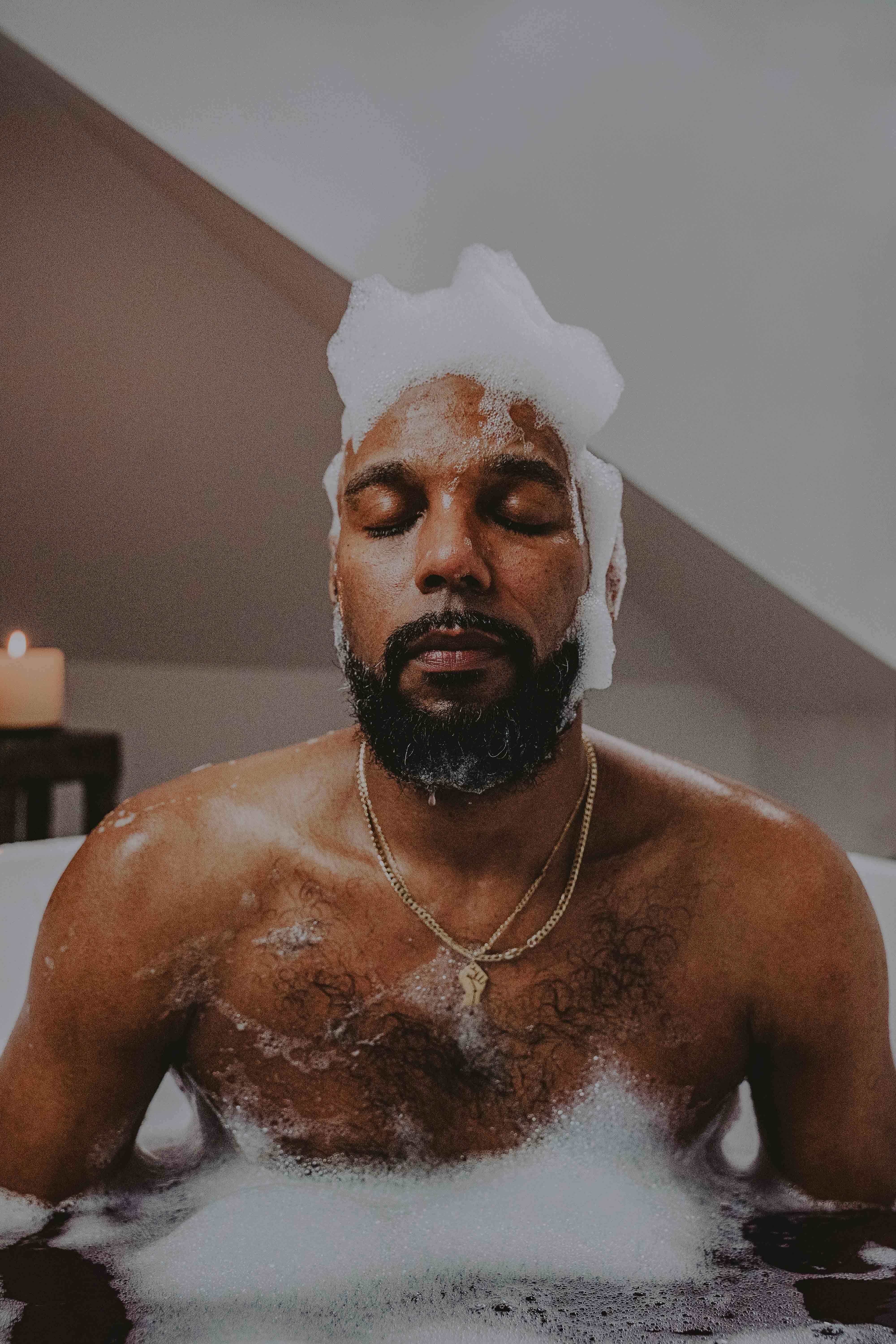
How much is masculinity a performance?
So much. I think masculinity is performance. I think femininity is a performance. I think Erving Goffman said, "Everybody in life is playing a role and that role could be mother, father, brother, sister. And they're either playing that role with sincerity or with cynicism, but we're all aware of those roles."
I think that the question is like, is masculinity a role that deserves retooling, reframing, restructuring?
Is there a way that we can go away from toxic masculinity and step into the divine masculine and go away from this necessity to control or to show strength and go into this landscape of vulnerability and providing space and being okay to not be okay?
How can women include men in the feminist movement?
I think women need men in the feminist movement, just like Black people need white people in the fight to dismantle white supremacy. I think that in order to include men, we have to provide space for men to be wrong. And for white people to be wrong, and to be okay with being wrong.
Being wrong is scary.
Yeah. But we also live in a society where we've got it all figured out. We're supposed to have all the answers and we're adults and we're grown. We should already have it figured out by now.
Can we all just admit that nobody has it figured out?
Nobody knows what the fuck they're doing. Nobody. Especially pertaining to COVID. If nothing has shown you that nobody has any idea what the fuck is going on, excuse my language, but COVID has got to be that thing. It's like are we in phase one, two, three, or fuck-me?
One second COVID is acting like a magnifying glass showing the entire world that the United States of America is indeed full of racist ass statues, you know? And then the next minute it's acting like a Dashiki-wearing African-American-studies-teaching, Black Panther, fist-in-the-air-pumping with a Malcolm X hat on backward and just bitch slapped the world and said, "Sit down with your racist ass and go read a book."
I think that the sooner we can say, 'Okay, we're all figuring this out together,' the sooner that real solutions will start developing.
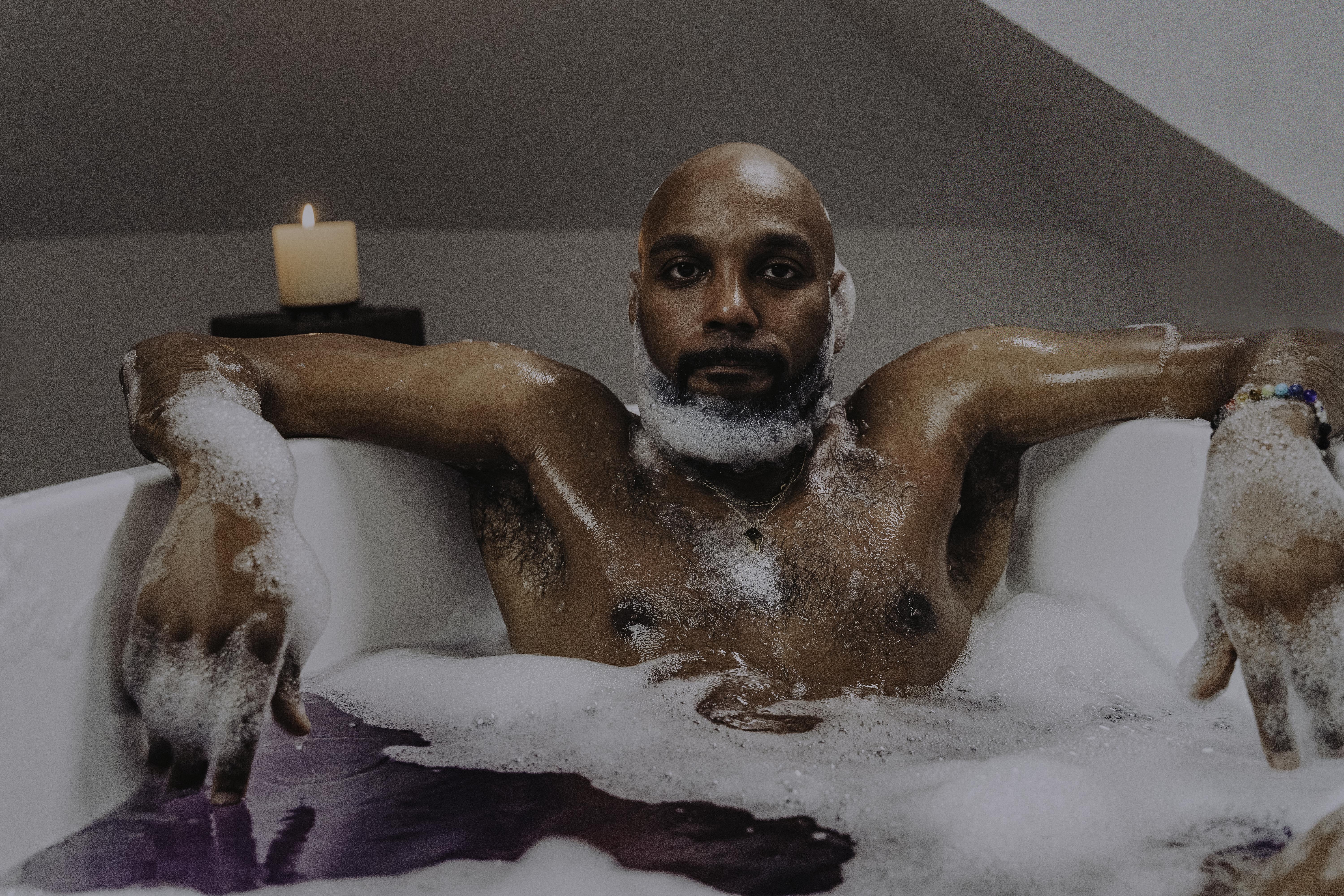
What in your life has had a profound impact on who you are sitting in this bath?
The first answer that comes to mind is ayahuasca. It was so great and it was so hard. It was so transformative. There are a few things I got from it, but some of the main tenants were that everything's gonna be okay and you have nothing to prove. That's a very powerful thing to realize.
When you get comfortable with walking your own path and knowing that as long as you can look yourself in the mirror and know that the decisions you made have not always been the right ones, but the ones that you made with the information that you had at the time, in the position that you were in at the time, and it was the best possible decisions that you can make, right?
Ayahuasca had a profound effect, it was probably something that freed me from that toxic masculinity I grew up in Texas, as well as that I existed in for a long time in the military.
If you could draw a parallel between the Christopher pre- and post-ayahuasca, what's the big difference?
I can't even say it was just ayahuasca 'cause, I mean, it was also like my entire university experience and it was also studying English theatre film and waking up the sleeping giant that had laid dormant for so long in the military.
Did you repress it?
I didn't really nurture that in the military. I didn't have mental space for it. It was always go-go-go-go-go. Once I was in university, I was reading more, I was writing more, I was acting more and increasing the sense of empathy that I had towards others.
Are you the man you want to be?
Yes and no. I think that's gotta be an ever-evolving thing that you have to continue to strive to be better, and better, and better. I know it sounds super cheesy and contrived, but I mean, I know I can do better and I will continue to do better, you know? Better than I did yesterday and I did today or tomorrow. But I know when I look in the mirror, I've done the best I could with what I have.
Thank you.
Thank you.
You get to be bubble knighted.
Do I cry now? I can.
No, no, no I don't want you to act.
No, I won't be acting. I can find it. This is a beautiful moment.
Let me ask you a question then. When you go find "it," where do you go?
It depends. I would find the beauty in this moment and the fact that it is only going to exist one time like every other moment. There's tragic beauty in that. It's the Pisces in me.
I know.
If it's for a part, I try to find the least common denominator, the truth. People are under the misconception that actors are always performing. I think you gotta be a really great truth-seeker and truth-teller to be a great actor. You have to find the truth in lies, in stuff that's fabricated. You have to find the truth for yourself. That's really what I strive to do.
I discovered there is another way to access emotion through breathing patterns, facial gesticulation, facial expressions, and body posture. It's very interesting because you can literally bring about those emotions in a very authentic way but without connecting it to thought.
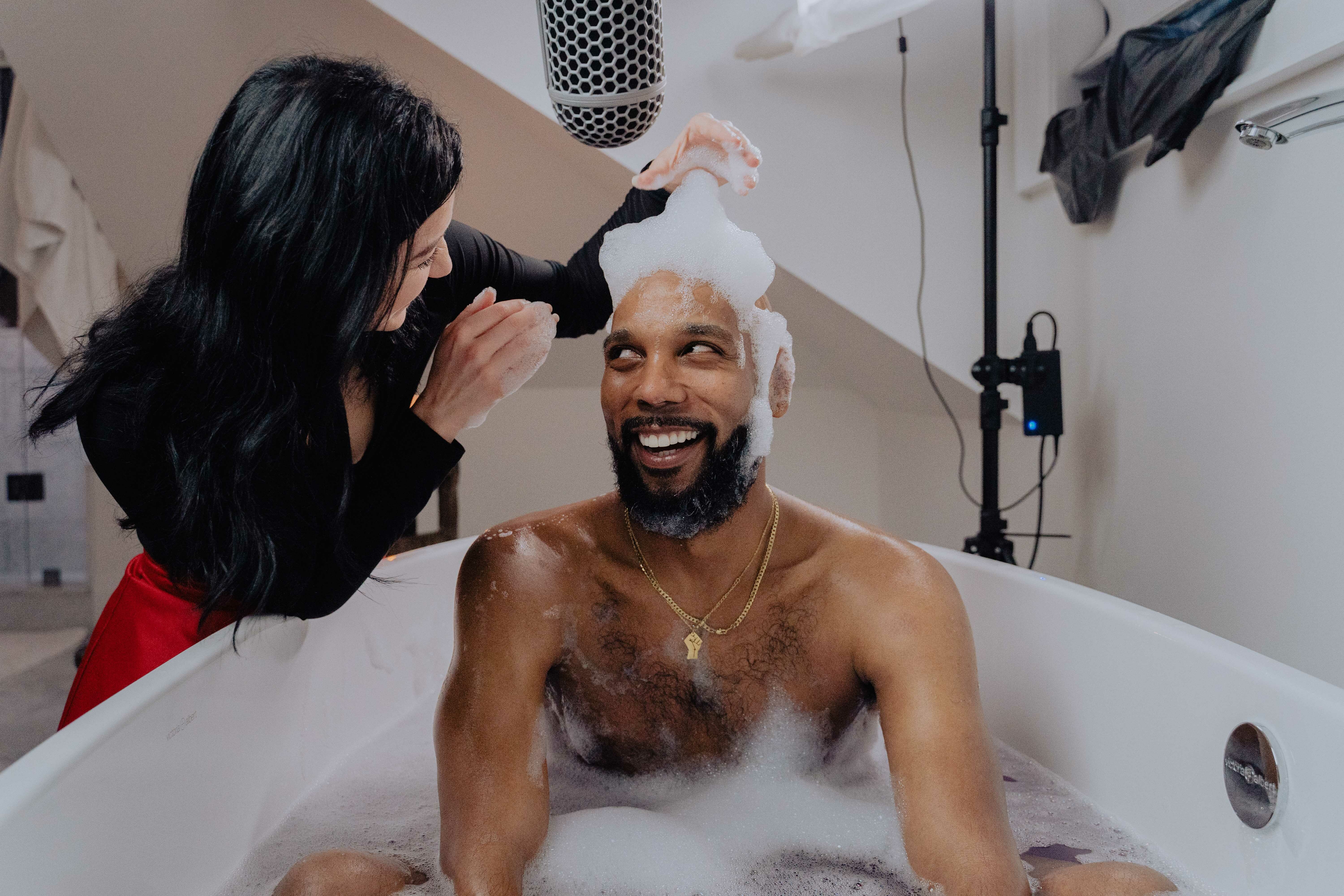
For someone who might feel like they have pent-up emotions, what's something that they can do to access or trick their mind into going to that place?
We're all walking around with emotions that we've kinda bottled in. For anyone interested in this kind of work, it's called Emotional Effector Patterns. I encourage you to take classes with a licensed instructor because it can be dangerous work if you're going to this place and you don't know what you're doing. Holding onto those emotions or sitting in those emotions for too long can have long-lasting effects on us.
And releasing them is the ultimate feeling.
